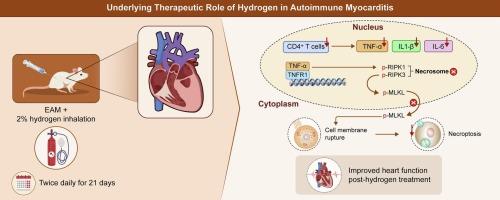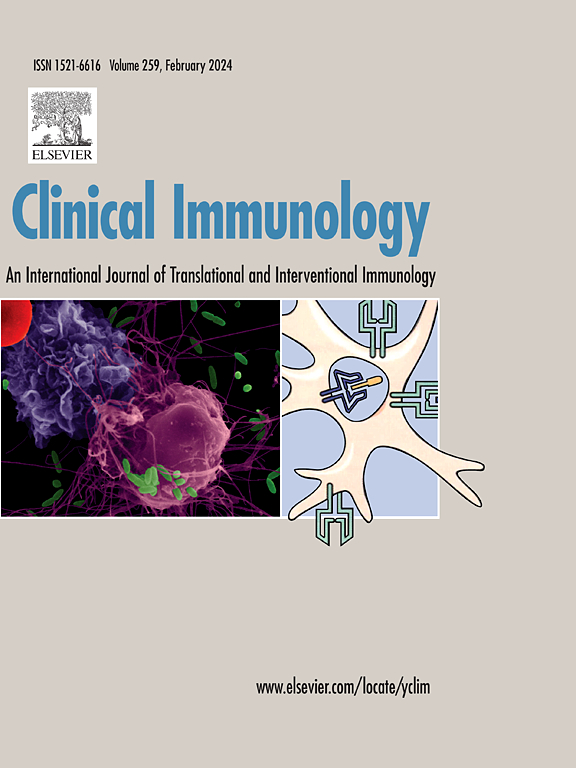氢通过TNF/TNFR1信号通路抑制坏死下垂,从而保护自身免疫性心肌炎
IF 3.8
3区 医学
Q2 IMMUNOLOGY
引用次数: 0
摘要
自身免疫性心肌炎是指由先天和适应性免疫反应引起的心肌组织炎症,其特征是肿瘤坏死因子-α (TNF-α)水平升高,这是一种典型的促炎因子。虽然氢具有抗炎和抗氧化的特性,但其治疗自身免疫性心肌炎的效果尚未得到评价。因此,本研究旨在探讨氢是否能通过TNF-α缓解自身免疫性心肌炎。通过皮下注射经完全弗氏佐剂乳化的猪源性心肌肌红蛋白,建立了BALB/c小鼠实验性自身免疫性心肌炎(EAM)模型。治疗组给予2%氢气吸入,每日2次,每次3 h,连用21 d。EAM组CD4+ T细胞表达高于对照组,氢治疗后这种升高减弱。此外,EAM组的TNF-α和相关炎症因子水平明显高于对照组,这些变化在氢治疗后被逆转。超声心动图评估显示,与EAM组相比,氢治疗后心功能有显著改善。病理结果显示,EAM治疗组心脏有明显的炎症细胞浸润和纤维化。组织免疫荧光和蛋白质免疫印迹显示,EAM组坏死下垂标志物升高,氢治疗后下调。本研究表明,氢通过TNF/TNFR1信号通路调节坏死性下垂,有效改善自身免疫性心肌炎,使其成为治疗心肌炎的一种有前景的新策略。本文章由计算机程序翻译,如有差异,请以英文原文为准。

Hydrogen protects against autoimmune myocarditis by inhibiting necroptosis via the TNF/TNFR1 signalling pathway
Autoimmune myocarditis refers to the inflammation of myocardial tissue caused by innate and adaptive immune responses, characterized by elevated levels of tumour necrosis factor-α (TNF-α), a classic pro-inflammatory factor. Although hydrogen exhibits anti-inflammatory and antioxidant properties, its therapeutic effects in autoimmune myocarditis have not been evaluated. Therefore, the present study aimed to explore whether hydrogen can alleviate autoimmune myocarditis via TNF-α. An experimental autoimmune myocarditis (EAM) model was established in BALB/c mice via subcutaneous injection of pig-derived myocardial myoglobin emulsified with complete Freund's adjuvant. The treatment group received 2 % hydrogen inhalation twice a day (3 h each time) for 21 days. CD4+ T cell expression was higher in the EAM group than in the Control group, and this increase was attenuated following treatment with hydrogen. Additionally, the levels of TNF-α and related inflammatory factors were substantially higher in the EAM group than in the Control group, and these changes were reversed following hydrogen treatment. Echocardiography assessments demonstrated a significant improvement in heart function following treatment with hydrogen compared to that in the EAM group. Pathological results revealed significant inflammatory cell infiltration and fibrosis in the hearts of the untreated EAM group. Tissue immunofluorescence and protein immunoblotting indicated elevated necroptosis markers in the EAM group, which were downregulated after treatment with hydrogen. This study demonstrates that hydrogen effectively ameliorated autoimmune myocarditis by modulating necroptosis via the TNF/TNFR1 signalling pathway, making it a promising novel therapeutic strategy for myocarditis.
求助全文
通过发布文献求助,成功后即可免费获取论文全文。
去求助
来源期刊

Clinical immunology
医学-免疫学
CiteScore
12.30
自引率
1.20%
发文量
212
审稿时长
34 days
期刊介绍:
Clinical Immunology publishes original research delving into the molecular and cellular foundations of immunological diseases. Additionally, the journal includes reviews covering timely subjects in basic immunology, along with case reports and letters to the editor.
 求助内容:
求助内容: 应助结果提醒方式:
应助结果提醒方式:


